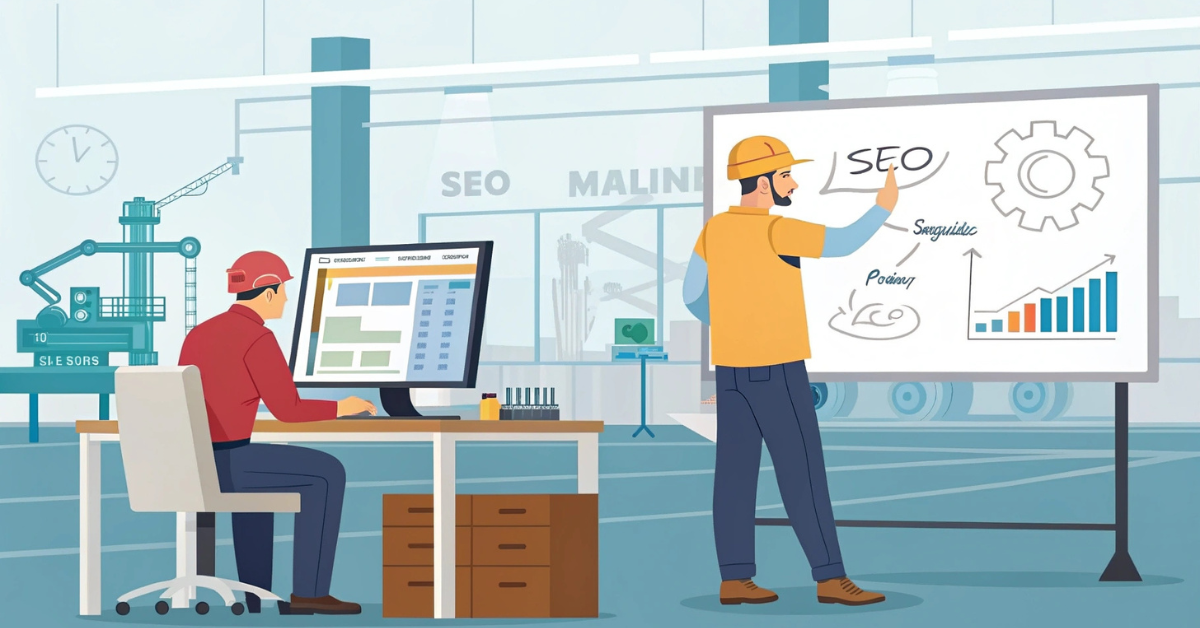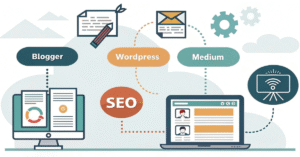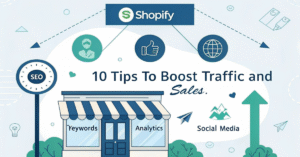In today’s highly competitive market, manufacturing companies can no longer rely solely on traditional marketing or word-of-mouth referrals to drive business growth. Buyers, procurement managers, and distributors are increasingly turning to search engines like Google to find suppliers, compare products, and evaluate services before making purchasing decisions. This is why search engine optimization (SEO) has become essential for manufacturing businesses.
SEO isn’t just about ranking high on Google; it’s about being visible to the right audience at the right time. For manufacturers, this means ensuring that engineers, procurement officers, B2B buyers, and distributors can easily find your products, services, and technical expertise online. In this blog, we’ll explore why SEO is so important for manufacturing businesses, what key benefits it delivers, and practical strategies to get started.
1. Change in buyer behaviour towards the product
The product sales cycle is longer and more complex than in many industries. Buyers don’t make impulse purchases; they carefully research, evaluate, and compare before contacting a seller. Studies show that over 70% of B2B buyers conduct online research before contacting a supplier.
This shift means that your company’s website and digital presence often act as the first point of contact with potential customers. If your business isn’t visible on search engines during the research phase, you risk losing opportunities to competitors who are.
SEO ensures your brand appears when buyers search for:
- Specific manufacturing capabilities (e.g., custom metal fabrication).
- Product categories (e.g., industrial boilers, precision machining parts).
- Local suppliers (e.g., manufacturing companies in Chicago).
- Technical solutions (e.g., how to reduce energy costs in production).
By optimizing for these searches, you position your business as a trusted, visible solution.
2. Building Brand Authority and Trust
In the manufacturing industry, credibility is important. Buyers want to work with trusted suppliers who demonstrate expertise and professionalism. SEO helps establish that trust by ensuring your website ranks for industry-specific keywords and by providing valuable, well-organized content.
- Content marketing with SEO: Blogs, whitepapers, and case studies optimized with targeted keywords showcase your technical knowledge.
- Backlinks from industry sites: Getting mentioned or linked on authoritative platforms signals reliability to both buyers and search engines.
- High visibility on SERPs (Search Engine Results Pages): Ranking consistently at the top builds brand recognition and trust over time.
When potential customers repeatedly see your business in search results, they begin to perceive your company as a leader in its niche.
3. Cost-Effective Lead Generation
Traditional marketing methods for manufacturers – such as trade shows, print catalogs, or outbound sales – can be expensive and have limited reach. SEO, on the other hand, provides long-term, cost-effective lead generation.
Unlike paid advertising, which stops producing results once you stop spending, SEO investments continue to generate traffic and leads for months and years. Once your content ranks well, it can consistently attract potential buyers without ongoing advertising costs.
This makes SEO a powerful channel for manufacturers looking to maximize ROI while targeting qualified B2B leads.
4. Local SEO for Manufacturing Companies
Many manufacturing businesses serve specific regions or industrial centers. Local SEO ensures that your company is visible when potential customers search for nearby suppliers.
For example:
- A buyer searching “plastic injection molding near Detroit” will see manufacturers who have optimized their Google Business Profile.
- Optimizing location-based keywords helps capture local demand.
- Managing online reviews boosts credibility and improves local rankings.
By investing in local SEO, manufacturers can attract more inquiries from nearby businesses, distributors, and contractors.
5. Driving Website Traffic and Conversions
SEO isn’t just about visibility – it’s about driving targeted traffic to your website. For manufacturers, this means reaching procurement managers, engineers, and decision makers who are actively searching for your products or services.
A well-optimized site improves conversions by:
- Providing detailed product information and specifications.
- Including calls-to-action (CTAs) like Request a Quote or Download a Brochure.
- Offering technical resources that buyers need before making decisions.
The result is not only increased traffic, but also more qualified leads and inquiries that can be converted into contracts and partnerships.
6. Staying competitive in the global market
Manufacturing is becoming increasingly globalized, with businesses competing not just locally but internationally. Without SEO, smaller manufacturers risk being overshadowed by larger players with more marketing resources.
By targeting niche keywords and industry-specific searches, even smaller manufacturers can compete effectively online. For example, instead of targeting broad terms like metal fabrication, you can optimize for long-tail keywords like custom stainless steel fabrication for the food industry.
This approach helps you attract highly relevant leads while avoiding direct competition with global giants.
7. Improving User Experience and Website Performance
A big part of SEO is improving a website’s usability, speed, and mobile responsiveness. For manufacturing companies, this is important because buyers expect professional, easy-to-navigate websites.
- Fast load times ensure visitors don’t leave before seeing your offerings.
- Mobile optimization is essential since many procurement managers browse on phones.
- Clear navigation helps buyers find technical specifications, certifications, and contact details quickly.
These improvements not only help with rankings but also enhance the customer experience, leading to more inquiries and sales.
8. SEO Supports Long Sales Cycles
Product sales cycles can last months, sometimes years, due to detailed evaluation, testing, and negotiations. SEO supports this long cycle by keeping your business visible and relevant at every stage:
- Awareness stage: Blog posts and guides introduce your expertise.
- Consideration stage: Case studies and whitepapers showcase real-world results.
- Decision stage: Optimized landing pages and product details help seal the deal.
By aligning SEO with the buyer’s journey, you stay on top of the entire process.
9. Measuring ROI with SEO
One of the biggest benefits of SEO is its scalability. Tools like Google Analytics, Google Search Console, and SEMrush allow marketers to track:
- Keyword rankings.
- Website traffic sources.
- Leads generated from organic search.
- Conversion rates on landing pages.
This data provides clarity on which strategies are working, allowing businesses to refine their SEO campaigns for better ROI.
10. Practical SEO Strategies for Manufacturing Businesses
To maximize the benefits of SEO, manufacturers should focus on these practical steps:
- Keyword Research: Target industry terms, technical phrases, and buyer intent keywords.
- On-Page Optimization: Use descriptive meta titles, descriptions, headers, and alt tags for product pages.
- Content Creation: Publish blogs, guides, and FAQs that answer common industry questions.
- Technical SEO: Improve site speed, mobile responsiveness, and indexing.
- Backlink Building: Partner with trade associations, industry blogs, and directories for links.
- Local SEO: Optimize Google Business Profile and use local keywords.
- Analytics & Tracking: Continuously monitor performance and adjust strategies.
These steps create a strong foundation for sustainable online visibility.
The importance of SEO for manufacturing businesses cannot be overstated. In a world where buyers rely on search engines for almost every purchasing decision, failing to optimize your online presence is tantamount to handing over business to competitors.
SEO helps manufacturers:
- Reach the right audience at the right time.
- Build trust and credibility.
- Generate cost-effective, long-term leads.
- Improve website performance and user experience.
- Compete in local and global markets.
By investing in SEO, manufacturers are not just improving their search rankings – they are strengthening their brands, supporting longer sales cycles, and driving measurable growth.
In an industry where efficiency and precision are everything, SEO ensures your business stays ahead in the digital age.







